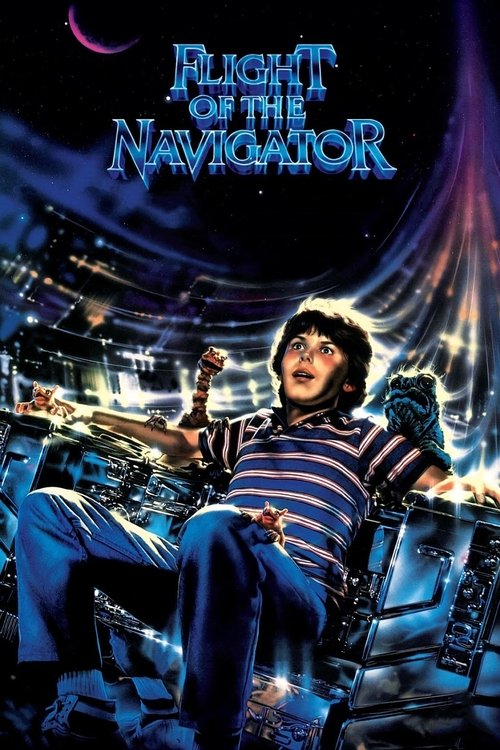
Title: Flight of the Navigator
Year: 1986
Director: Randal Kleiser
Writer: Matt MacManus
Cast: Joey Cramer (David Scott Freeman),
Paul Reubens (Max (voice)),
Veronica Cartwright (Helen Freeman),
Cliff DeYoung (Bill Freeman),
Sarah Jessica Parker (Carolyn McAdams),
Runtime: 90 min.
Synopsis: 12-year-old David is accidentally knocked out in the forest near his home, but when he awakens eight years have passed. His family is overjoyed to have him back, but is just as perplexed as he is that he hasn't aged. When a NASA scientist discovers a UFO nearby, David gets the chance to unravel the mystery and recover the life he lost.
Rating: 6.957/10
A Cosmic Joyride That Still Soars: Revisiting Flight of the Navigator
/10
Posted on August 26, 2025
What if a single summer night could catapult you into a future where everyone you love has moved on without you? Flight of the Navigator (1986), directed by Randal Kleiser, flings us into this haunting yet exhilarating premise with a charm that feels as fresh today as it did nearly four decades ago. This sci-fi gem follows David, a 12-year-old who, after a mysterious blackout, wakes up eight years later, unaged, and entangled with a puckish alien ship. For today’s audiences, weaned on multiverses and AI anxieties, the film’s blend of heart, wonder, and subtle unease hits a nostalgic sweet spot while posing timeless questions about time, family, and humanity’s place in the cosmos.
Kleiser’s direction is a masterclass in balancing intimacy with spectacle. He grounds the fantastical a gleaming, shape-shifting spaceship voiced with impish glee by Paul Reubens in the raw emotion of a kid grappling with a world that’s left him behind. The film’s pacing, brisk yet never rushed, lets David’s disorientation breathe, making his reunion with his now-older family (a gut-punch delivered with quiet restraint) resonate deeply. Compare this to modern blockbusters that often drown character in CGI chaos, and Navigator feels like a lost art form: a story that trusts its audience to feel as much as they marvel. The cinematography, by James Glennon, amplifies this. His warm, sun-dappled shots of 1978 Florida contrast starkly with the sterile, neon-lit labs of 1986, mirroring David’s temporal dislocation. The ship’s sleek, reflective design practical effects that still dazzle grounds the fantastical in tactile reality, a stark contrast to today’s overpolished VFX.
Yet, the film isn’t flawless. The score by Alan Silvestri, while rousing, occasionally leans too hard into synth-heavy 80s cheese, undercutting the emotional weight of key scenes. Some supporting performances, particularly the NASA scientists, veer into caricature, though Joey Cramer’s raw, unaffected turn as David anchors the film. What keeps Navigator vital is its prescience: its AI-like ship, Max, feels like a proto-Siri with attitude, tapping into our current fascination with tech that’s both ally and enigma. For Gen Z viewers, raised on Stranger Things and retro-revival, this is catnip a lean, heartfelt adventure that doesn’t overstay its welcome.
In an era of bloated franchises, Flight of the Navigator reminds us that sci-fi can be small, strange, and soulful. It’s a time capsule that still rockets forward, daring us to wonder what we’d do if we lost our place in time and found it among the stars.
0
0
